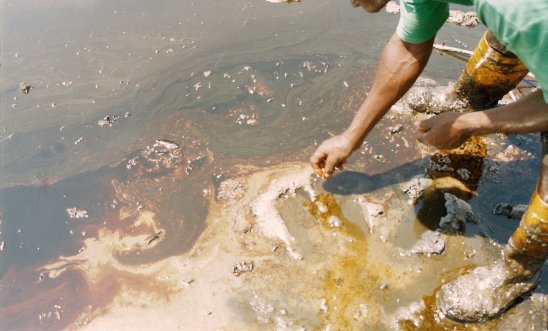
Our Blood! Our Womb! The Dark Side of Oil

Blog by Melody Barry-Yobo
The Niger Delta of Nigeria, the third-largest mangrove ecosystem in the world – naturally endowed with green vegetation and flowing rivers – is home to different ethnic groups, including the Ogonis. It was a food basket and remained a paragon of beauty until darkness closed on her at noon in 1956 when oil was discovered in Oloibiri, a town in the present Bayelsa State.
We had been told that it was development, but it was the extinguishment of our livelihoods. It would be the dawn of a new era, a beautiful beginning, but it was really hell wearing a suit – devastation, deprivation, denial. A sly smile, and a handshake wrapped in greed and exploitation, death exchanged for profit. The liquid black gold has turned to a serpent, biting our heels, and leaving the women grieving. Was it a curse or a blessing to be born in the Niger Delta? Today, Ogoniland is one of the ten most polluted places on earth as a result of oil and gas exploration activities by Shell. We’ve lost most of our livelihoods, the farming and the fishing that fed us and paid the cost of our family lives. Farmlands lie in ruin from oil pollution, streams and rivers are contaminated, and there is no clean drinking water – our people drink water contaminated with benzene, 900 levels above WHO guidelines. With approximately 1,481 wells, 275 flow stations, over 7,000 kilometres of oil and gas pipelines, and over 120 gas-flare furnaces, the Niger Delta remains one of the most polluted places on earth.
Oil multinationals, including Shell and others, have operated in the region for over 7 decades, with nothing to show for the billions of dollars they have carted away. We have had to leave our homes, and communities have had to migrate, often stranded in places alien to them, grappling with cancer and other terminal diseases.
When oil flowed, our soil bleeds.
Women in the Niger Delta used to grow crops on their lands, but now are unable to feed their children. Women, who traditionally bear the burden of the home: cooking, caring, washing of clothes and fetching water, now have to walk for miles in search of drinking water and alternative food sources, and do menial jobs. Many have died, and some still live with the mental torture and STIs from the 1994-1995 Okuntimo-led military incursion [1] and [2].
Reproductive and health effects
In a recent research study conducted in Otuabagi community in Bayelsa State, where blind samples were taken from 80 women, 15 Polycyclic Aromatic Hydrocarbons (PAHs) – linked to reproductive health issues, including birth defects, miscarriages, and infertility – were found at levels, far exceeding World Health Organization (WHO) limits. Every year, women are increasingly at risk to preeclampsia, haemorrhage, and early menopause, causing significant trauma, as many childless women continue to face stigmatisation from their families and society. I lost my daughter, Anita, to leukaemia . She died shortly after her 11th birthday in the hospital – we think that the poisons had made their way into her blood.
Undefeated and resilient
Despite the decades of oil spills, gas flaring, and environmental pollution (and degradation), women in the Niger Delta have remained resilient in their demand for environmental, economic, and social justice. Women like myself struggle to bring our cases into the spotlight in an appeal for action. But instead of righting the wrongs championed by Shell, the Federal Government of Nigeria is orchestrating oil exploration resumption in Ogoniland.
We have seen women in the Niger Delta organise, show leadership, and bring together their communities to demand justice from Shell.
We also see the solidarity and actions people are taking around the world. Solidarity brings strength to people, to campaign, and to know that people around the world are calling for justice.
To the people in the Niger Delta, this is Ecocide!
We say no to oil exploration in Ogoniland and the Niger Delta today!
Melody Barry-Yobo is an environmental advocate and Program Coordinator for Climate and Gender Issues at the Lekeh Development Foundation. She focuses on environmental justice in the Niger Delta, demanding accountability from companies (including Shell) for pollution, and advocating for cleanup and compensation. In her work she champions the voices of women and young girls.
Our blogs are written by Amnesty International staff, volunteers and other interested individuals, to encourage debate around human rights issues. They do not necessarily represent the views of Amnesty International.
0 comments